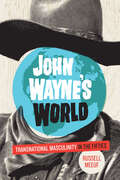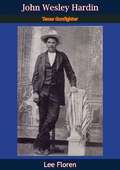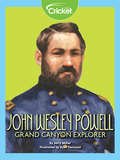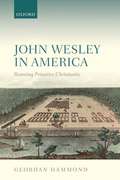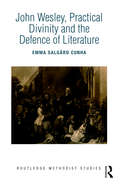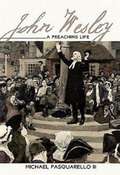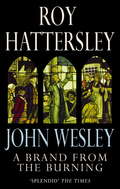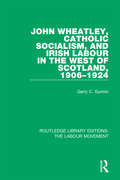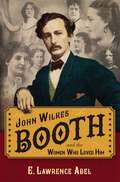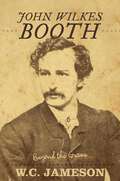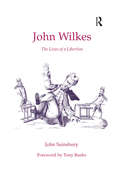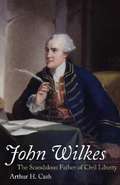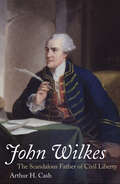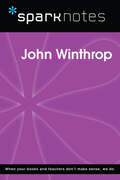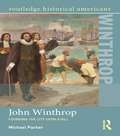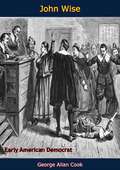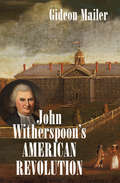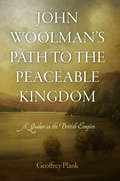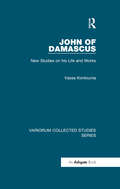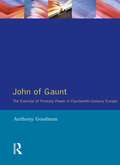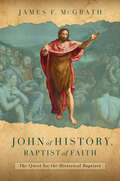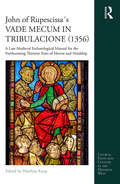- Table View
- List View
John Wayne's World: Transnational Masculinity in the Fifties
by Russell MeeufThis cultural study examines the significance of John Wayne as a global symbol of masculinity in the mid-twentieth century. In a film career that spanned five decades, John Wayne became a US icon of heroic individualism and rugged masculinity. His widespread popularity, however, was not limited to the United States: he was beloved among moviegoers in Asia, Africa, Latin America, and Europe. In John Wayne&’s World, Russell Meeuf considers the actor&’s global popularity and makes the case that Wayne&’s depictions of masculinity in his most popular films of the 1950s reflected the social disruptions of global capitalism and modernization during that time. John Wayne&’s World places the actor at the center of gender- and nation-based ideologies, opening a dialogue between film history, gender studies, political and economic history, and popular culture. Moving chronologically, Meeuf provides new readings of the films Fort Apache, Red River, Hondo, The Searchers, Rio Bravo, and The Alamo and connects Wayne&’s characters with a modern image of masculinity taking shape after World War II. Considering Wayne&’s international productions, such as Legend of the Lost and The Barbarian and the Geisha, Meeuf shows how they resonated with US ideological positions about Africa and Asia. Meeuf concludes that, in his later films, Wayne&’s image shifted to one of grandfatherly nostalgia for the past, as his earlier brand of heroic masculinity became incompatible with the changing world of the 1960s and 1970s.
John Wesley Hardin: Texas Gunfighter
by Lee FlorenTHE TRUE STORY OF THE BOY KILLER, JOHN WESLEY HARDIN, ACE OF THE FAST-GUN CROWD….MURDERER OF FORTY MEN….LIVING AND DYING WESTERN STYLE was paced by the fast-gun gentry, and John Wesley Hardin was the most prominent pace-setter among them. No gun in Texas was so deadly; no gunfighter so young. And yet many said he was a smart, friendly man, fighting on the side of Right...against the cruel and corrupt Carpetbaggers who overran his beloved Lone Star State...Hardin, criminal or saint, was fearless...and fast. He survived the blazing guns of other killers, countless Ranger roundups, the bloody Taylor-Sutton Feud, lynching parties and stalks by Pinkerton detectives. He outwitted his guards at the prison in Huntsville who tried to break him via the inhuman and ingenious “Water-house Torture.” He even survived his own reputation....In middle-age John Wesley Hardin became a lawyer and was admitted to the Texas Bar.But could he survive his own nature’s dark side?
John Wesley Powell: Grand Canyon Explorer
by Jerry MillerJohn Wesley Powell was known for his explorations of the canyon land area of southern Utah and northern Arizona, still "unknown" in the 1860s.
John Wesley in America: Restoring Primitive Christianity
by Geordan HammondWhy did John Wesley leave the halls of academia at Oxford to become a Church of England missionary in the newly established colony of Georgia? Was his ministry in America a success or failure? These questions--which have engaged numerous biographers of Wesley--have often been approached from the vantage point of later developments in Methodism. Geordan Hammond presents the first book-length study of Wesley's experience in America, providing an innovative contribution to debates about the significance of a formative period of Wesley's life. John Wesley in America addresses Wesley's Georgia mission in fresh perspective by interpreting it in its immediate context. In order to re-evaluate this period of Wesley's life, Hammond carefully considers Wesley's writings and those of his contemporaries. A laboratory for implementing his views of primitive Christianity, the mission served to restore the doctrine, discipline, and practice of the early church in the pristine Georgia wilderness. Understanding the centrality of primitive Christianity to Wesley's thinking and pastoral methods is essential to comprehending his experience in America. Wesley's conception of primitive Christianity was rooted in his embrace of patristic scholarship at Oxford. The most direct influence, however, was the High Church ecclesiology of the Usager Nonjurors who inspired him with their commitment to the restoration of the primitive church.
John Wesley, Practical Divinity and the Defence of Literature (Routledge Methodist Studies Series)
by Emma Salgård CunhaJohn Wesley (1703–1791), leader of British Methodism, was one of the most prolific literary figures of the eighteenth century, responsible for creating and disseminating a massive corpus of religious literature and for instigating a sophisticated programme of reading, writing and publishing within his Methodist Societies. <P><P>John Wesley, Practical Divinity and the Defence of Literature takes the influential genre of practical divinity as a framework for understanding Wesley’s role as an author, editor and critic of popular religious writing. It asks why he advocated the literary arts as a valid aspect of his evangelical theology, and how his Christian poetics impacted upon the religious experience of his followers.
John Wesley: A Preaching Life
by Michael Pasquarello IIIThat John Wesley was not a systematic theologian is a point frequently made. Yet if that be the case, what kind of theologian was he? To look at his literary output over the course of his long life and ministry is to recognize the central role that sermons played. Thus, claims Michael Paquarello, Wesley was a homiletical theologian, one for whom the Word preached was the core means of reflecting on and understanding the meaning of the Gospel.In this "preaching life" of Wesley Pasquarello places Wesley's sermons in the larger religious, political, and intellectual world of their eighteenth-century context. Neither a biography nor an intellectual history, it is a homiletic history, one that both uses the details of Wesley's milieu to build a framework for understanding his sermons, and that illumines the practical wisdom embodied in the content, form, and style of Wesley's preaching. John Wesley: A Preaching Life vividly portrays the centrality of Wesley's preaching to the religious revival that transformed eighteenth-century England.
John Wesley: The Life of John Wesley
by Roy HattersleyJohn Wesley led the Second English Reformation. His Methodist 'Connexion' was divided from the Church of England, not by dogma and doctrine but by the new relationship which it created between clergy and people. Throughout a life tortured by doubt about true faith and tormented by a series of bizarre relationships with women, Wesley kept his promise to 'live and die an ordained priest of the Established Church'. However by the end of the long pilgrimage - from the Oxford Holy Club through colonial Georgia to every market place in England - he knew that separation was inevitable. But he could not have realised that his influence on the new industrial working class would play a major part in shaping society during the century of Britain's greatest power and influence and that Methodism would become a worldwide religion and the inspiration of 20th century television evangelism.
John Wheatley, Catholic Socialism, and Irish Labour in the West of Scotland, 1906-1924 (Routledge Library Editions: The Labour Movement #14)
by Gerry C. GunninFirst published in 1987. This examination of the career of John Wheatley indicates the way in which one Irishman – reared among Liberal and Radical coal miners and taught by Roman Catholic priests and nationalist leaders to regard obedience to the Catholic Church and promotion of Home Rule as the vital interests for Irish Catholics – became a Socialist and adapted his Radical political views and devotional Roman Catholic convictions to a Parliamentary and Catholic Socialism. This title will be of interest to scholars and students of British and Labour history.
John Wilkes Booth and the Women Who Loved Him
by E. Lawrence AbelWhen John Wilkes Booth died—shot inside a burning barn and dragged out twelve days after he assassinated President Lincoln—all he had in his pocket were a compass, a candle, a diary, and five photographs of five different women. They were not ordinary women. Four of them were among the most beautiful actresses of the day; the fifth was Booth's wealthy fiancée. And those five women are just the tip of the iceberg. Before he shot the president of the United States and entered the annals of history as a killer, actor John Wilkes Booth had quite a way with women. There was the actress who cut his throat and almost killed him in a jealous rage. There was the prostitute who tried to kill herself because he abandoned her. There was the actress who would swear she witnessed him murdering Lincoln, even though she was thousands of miles away at the time. John Wilkes Booth was hungry for fame, touchy about politics, and a notorious womanizer. But this book isn't about John Wilkes Booth---not really. This book is about his women: women who were once notorious in their own right; women who were consumed by love, jealousy, strife, and heartbreak; women whose lives took wild turns before and after Lincoln's assassination; women whom have been condemned to the footnotes of history... until now.
John Wilkes Booth: Beyond the Grave (Beyond the Grave)
by W.C. JamesonLeading the reader through a series of amazing coincidences and details, this book presents startling evidence that John Wilkes Booth, the assassin of President Lincoln, was never captured but escaped to live for decades, continue his acting career, marry, and have children. Compelling and revealing information in the form of papers and diaries has recently been found in private collections—materials that provide greater insight into the events leading up to the assassination of Lincoln as well as details of the pursuit and capture of the man the government claimed was Booth.
John Wilkes: The Lives of a Libertine
by John SainsburyJohn Wilkes remains one of the most colourful and intriguing characters of eighteenth-century Britain. Born in 1725, the son of a prosperous London distiller, he was given the classical education of a gentleman, before entering politics as a Whig. Finding his party in opposition following the accession of George III in 1760 he took up his pen with sensational effect, and made a career out of excoriating the new administration and promoting the Whig interest. His charismatic style and vicious wit soon ensured that he became a figurehead for the radical cause, earning him many admirers and many enemies. Amongst the latter were the king, and the artist William Hogarth who famously depicted Wilkes as a grinning, squint-eyed, pug-nosed agent of misrule. Whilst Wilkes's political career has been much explored, particularly the period between 1763 and 1774, much less has been written about his remarkable private life. This biography provides a more comprehensive examination of Wilkes throughout his long life than has hitherto been available. Taking a thematic, rather than chronological approach it is divided into six main chapters covering family, ambition, sex, religion, class and money, which allows a much more rounded picture of Wilkes to emerge. In so doing it provides a fascinating insight, not only into one of the most intriguing characters of the Georgian period, but also into wider eighteenth-century British society and its shifting attitudes to morality, politics and gender.
John Wilkes: The Scandalous Father of Civil Liberty
by Arthur H. CashThis book is about an audacious journalist and politician who was born in the City of London in 1726 and died in the City of Westminster in 1797, his life spanning a time that included the American Revolution, which he admired, the French Revolution, which he hated, and the industrial revolution, which he did not know was happening.
John Wilkes: The Scandalous Father of Civil Liberty
by Arthur H. CashPulitzer Prize Finalist: A biography of the wildly colorful eighteenth-century British politician who became &“the toast of American revolutionaries&” (Booklist). One of the most colorful figures in English political history, John Wilkes (1726–97) is remembered as the father of the British free press, a defender of civil and political liberties—and a hero to American colonists. Wilkes&’s political career was rancorous, involving duels, imprisonments in the Tower of London, and the Massacre of St. George&’s Fields, in which seven of his supporters were shot to death by government troops. He was equally famous for his &“private&” life—as a confessed libertine, a member of the notorious Hellfire Club, and the author of what has been called the dirtiest poem in the English language. This lively biography draws a full portrait of John Wilkes from his childhood days through his heyday as a journalist and agitator, his defiance of government prosecutions for libel and obscenity, his fight against exclusion from Parliament, and his service as lord mayor of London on the eve of the American Revolution. Told here with the force and immediacy of a firsthand newspaper account, Wilkes&’s own remarkable story is inseparable from the larger story of modern civil liberties and how they came to fruition. &“[Does] justice to Wilkes both as a fiery proponent of individual rights and as . . . a libertine par excellence in an age with no shortage of memorable rakes.&” —The New York Times &“It is difficult to believe that John Wilkes, a notorious womanizer and scandal-monger, was a genuine hero of civil liberties and political democracy on both sides of the Atlantic in the late 18th century, but hero he was and in this engaging book Arthur Cash gives Wilkes the serious treatment he has long deserved.&” —Eric Foner, Winner of the Pulitzer Prize in History and New York Times–bestselling author of Reconstruction
John Williams's Film Music: Jaws, Star Wars, Raiders of the Lost Ark, and the Return of the Classical Hollywood Music Style
by Emilio AudissinoJohn Williams is one of the most renowned film composers in history. He has penned unforgettable scores for "Star Wars," the "Indiana Jones "series, "E. T. the Extra-Terrestrial," "Jaws," "Superman," and countless other films. Fans flock to his many concerts, and with forty-nine Academy Award nominations as of 2014, he is the second-most Oscar-nominated person after Walt Disney. Yet despite such critical acclaim and prestige, this is the first book in English on Williams's work and career. Combining accessible writing with thorough scholarship, and rigorous historical accounts with insightful readings, "John Williams's Film Music "explores why Williams is so important to the history of film music. Beginning with an overview of music from Hollywood's Golden Age (1933-58), Emilio Audissino traces the turning points of Williams's career and articulates how he revived the classical Hollywood musical style. This book charts each landmark of this musical restoration, with special attention to the scores for "Jaws" and" Star Wars," Williams's work as conductor of the Boston Pops Orchestra, and a full film/music analysis of "Raiders of the Lost Ark. " The result is a precise, enlightening definition of Williams's "neoclassicism" and a grounded demonstration of his lasting importance, for both his compositions and his historical role in restoring part of the Hollywood tradition. "
John Winthrop (SparkNotes Biography Guide)
by SparkNotesJohn Winthrop (SparkNotes Biography Guide) Making the reading experience fun! SparkNotes Biography Guides examine the lives of historical luminaries, from Alexander the Great to Virginia Woolf. Each biography guide includes:An examination of the historical context in which the person lived A summary of the person&’s life and achievements A glossary of important terms, people, and events An in-depth look at the key epochs in the person&’s career Study questions and essay topics A review test Suggestions for further reading Whether you&’re a student of history or just a student cramming for a history exam, SparkNotes Biography guides are a reliable, thorough, and readable resource.
John Winthrop: Founding the City Upon a Hill (Routledge Historical Americans)
by Michael ParkerPuritan politician, lawyer, and lay theologian John Winthrop fled England in 1630 when it looked like Charles I had successfully blocked all hopes of passing Puritan-inspired reforms in Parliament. Leading a migration, he came to New England in the hopes of creating an ideal Puritan community and eventually became the governor of Massachusetts. Winthrop is remembered for his role in the Puritan migration to the colonies and for delivering what is probably the most famous lay sermon in American history, "A Model of Christian Charity." In it he proclaimed that New England would be "a city upon a hill"--an example for future colonies. In John Winthrop: Founding the City upon a Hill, Michael Parker examines the political and religious history of this iconic figure. In this short biography, bolstered by letters, sermons, and maps, John Winthrop introduces students to the colonial world, the Pequot Wars, and the history of American Exceptionalism.
John Wise: Early American Democrat
by George Allan CookA biography of the 17th to 18th century reverend and New England political figure John Wise, who lead his town in protest against an arbitrarily imposed tax, acted as spokesman for one of the earliest 'No taxation without representation' challenges, petitioned for two of the most vigorously prosecuted victims in the Salem witch trials, and who advocated many other causes during his life.
John Witherspoon's American Revolution (Published by the Omohundro Institute of Early American History and Culture and the University of North Carolina Press)
by Gideon MailerIn 1768, John Witherspoon, Presbyterian leader of the evangelical Popular party faction in the Scottish Kirk, became the College of New Jersey's sixth president. At Princeton, he mentored constitutional architect James Madison; as a New Jersey delegate to the Continental Congress, he was the only clergyman to sign the Declaration of Independence. Although Witherspoon is often thought to be the chief conduit of moral sense philosophy in America, Mailer's comprehensive analysis of this founding father's writings demonstrates the resilience of his evangelical beliefs. Witherspoon's Presbyterian evangelicalism competed with, combined with, and even superseded the civic influence of Scottish Enlightenment thought in the British Atlantic world.John Witherspoon's American Revolution examines the connection between patriot discourse and long-standing debates--already central to the 1707 Act of Union--about the relationship among piety, moral philosophy, and political unionism. In Witherspoon's mind, Americans became different from other British subjects because more of them had been awakened to the sin they shared with all people. Paradoxically, acute consciousness of their moral depravity legitimized their move to independence by making it a concerted moral action urged by the Holy Spirit. Mailer's exploration of Witherspoon's thought and influence suggests that, for the founders in his circle, civic virtue rested on personal religious awakening.
John Woolman's Path to the Peaceable Kingdom
by Geoffrey PlankThe abolitionist John Woolman (1720-72) has been described as a "Quaker saint," an isolated mystic, singular even among a singular people. But as historian Geoffrey Plank recounts, this tailor, hog producer, shopkeeper, schoolteacher, and prominent Quaker minister was very much enmeshed in his local community in colonial New Jersey and was alert as well to events throughout the British Empire. Responding to the situation as he saw it, Woolman developed a comprehensive critique of his fellow Quakers and of the imperial economy, became one of the most emphatic opponents of slaveholding, and helped develop a new form of protest by striving never to spend money in ways that might encourage slavery or other forms of iniquity.Drawing on the diaries of contemporaries, personal correspondence, the minutes of Quaker meetings, business and probate records, pamphlets, and other sources, John Woolman's Path to the Peaceable Kingdom shows that Woolman and his neighbors were far more engaged with the problems of inequality, trade, and warfare than anyone would know just from reading the Quaker's own writings. Although he is famous as an abolitionist, the end of slavery was only part of Woolman's project. Refusing to believe that the pursuit of self-interest could safely guide economic life, Woolman aimed for a miraculous global transformation: a universal disavowal of greed.
John and Betty Stam: Missionary Martyrs
by Vance ChristiePart of the Heroes of The Faith series, this is the biography of John and Betty Stam martyred in China in 1934.
John of Brienne
by Guy PerryJohn of Brienne's progress, from mid-ranking knightly status to king of Jerusalem and, later, Latin emperor of Constantinople, traces one of the most remarkable careers in the entire medieval period. But how and why did he achieve such heights? This biographical study of aristocratic social and geographical mobility in the 'Age of the Crusades' reassesses John's fascinating life, and explores how families and dynasticism, politics, intrigue, religion and war all contributed to John's unprecedented career. John was a major figure in the history of the thirteenth-century Mediterranean, and yet very much a product of the workings of the society of his day. This book reveals how John's life, and its multifarious connections to France, Italy, the German empire and the papacy, can illuminate the broad panorama of the early thirteenth-century world, and the zenith of the crusading movement.
John of Damascus: New Studies on his Life and Works (Variorum Collected Studies #1053)
by Vassa KontoumaFor more than five hundred years the life and work of John of Damascus (c. 655-c.745) have been the subject of a very extensive literature, scholarly and popular, in which it is often difficult to get one’s bearings. Through the studies included here (of which 6 appear in a translation into English made specially for this volume), Vassa Kontouma provides a critical review of this literature and attempts to answer several open questions: the author and date of composition of the official Life of John, the philosophical significance of the Dialectica (a study which has its first publication here), the original structure of the Exposition of the Orthodox faith, the identity of ps.-Cyril, the authenticity of the Letter on Great Lent, and questions of Mariology. She also opens new vistas for research along four main lines: the life of John of Damascus and its sources, Neochalcedonian philosophy, systematic theology in Byzantium, and Christian practices under the Umayyads.
John of Gaunt: The Exercise of Princely Power in Fourteenth-Century Europe
by Anthony GoodmanJohn of Gaunt (1340 -99), Duke of Lancaster and pretender to the throne of Castile, was son to Edward III, uncle to the ill-starred Richard III and father to Henry IV and the Lancastrian line. The richest and most powerful subject in England, a key actor on the international stage, patron of Wycliffe and Chaucer, he was deeply involved in the Peasant's revolt and the Hundred Years War. He is also one of the most hated men of his time. This splendid study, the first since 1904, vividly portrays the political life of the age, with the controversial figure of Gaunt at the heart of it.
John of History, Baptist of Faith: The Quest for the Historical Baptizer
by James F. McGrathStudies of the historical Jesus typically reduce John the Baptist to a subordinate role in the story of Christian origins. This meticulous historical study focuses on John himself, revealing his extensive and enduring influence. In the popular imagination, John the Baptist plays the supporting role of Jesus&’s unkempt forerunner. But meticulous historical study reveals his wide-reaching and enduring influence on the history of religion. The first study of its kind, John of History, Baptist of Faith sheds light on the historical John the Baptist and his world. James F. McGrath applies historical-critical methodology not only to the New Testament but also to the Mandaean Book of John, a holy text of the last extant gnostic sect. McGrath uses the teachings of John&’s pupil, Jesus, as a window into his mentor&’s beliefs. Along the way, he brings new clarity to questions of contention among scholars, such as John&’s use of immersion as a substitute for temple sacrifice. Bold in its claims yet careful in its method, John of History, Baptist of Faith lends fresh insight into John, Jesus, and their world. McGrath&’s pioneering monograph will challenge and intrigue students and scholars of the New Testament and Second Temple Judaism.
John of Rupescissa´s VADE MECUM IN TRIBULACIONE: A Late Medieval Eschatological Manual for the Forthcoming Thirteen Years of Horror and Hardship (Church, Faith and Culture in the Medieval West)
by Matthias KaupThe VADE MECUM IN TRIBULACIONE was meant as an eschatological manual for the thirteen catastrophic years between its composition in December 1356 and the Thousand-Year Reign of Christ expected to begin in 1370. This manual, permeated by passion for clerical reform, was intended to give righteous Christians practical and spiritual advice on how to survive this period of tribulation. Likewise, it aimed to inform them about what to expect from the envoys of Satan, the Western and the Eastern Antichrists, but also from Christ’s warriors, the papal restorer and his secular assistant, the French-Roman Emperor. Moreover, it offered a brief outline of Christ’s Thousand-Year Reign and of Armageddon. The VADE MECUM was written by John of Rupescissa OFM (c. 1310-1366), the most prolific apocalyptic author of the Middle Ages, as the central work of in all three manuals designed to prepare Christendom for the impending crises. As a completely new text type and summary of the late Rupescissa’s doctrines, this eschatological manual fascinated numerous readers in the Late Middle Ages, who copied, reworked and translated it and made it thus a pivotal text of medieval apocalypticism: ten versions of the Latin VADE MECUM in more than forty manuscripts have come down to us. Rupescissa’s eschatological manual is his last known and most widely distributed work; the present study provides an annotated critical edition equipped with an English translation. It inducts in the manual’s contents, places them in the context of Rupescissa’s work and medieval prophetic literature, investigates important aspects of its reception and clarifies the relationships between its different versions. Furthermore, it ends with a critical edition of the VENI MECUM IN TRIBULACIONE, the most influential compendious version of the VADE MECUM. Thus this book offers an indispensable fundamental contribution to the flourishing studies of Rupescissa and medieval apocalypticism.
